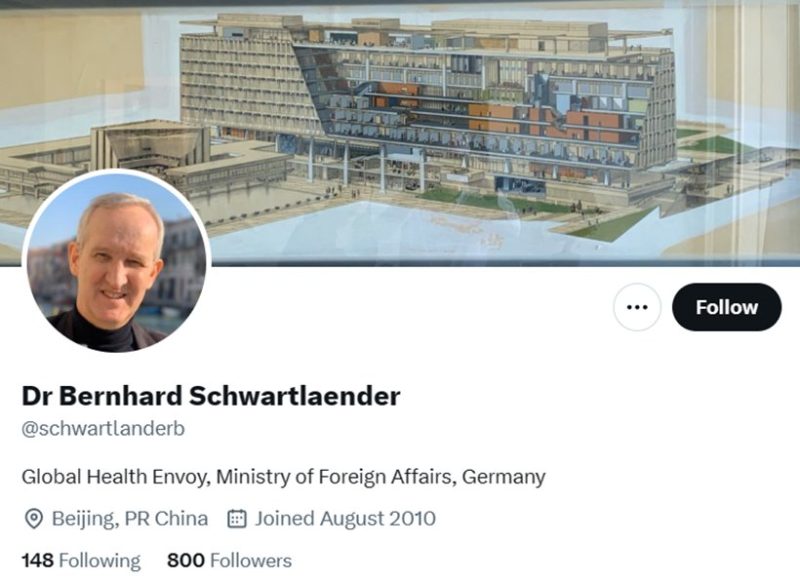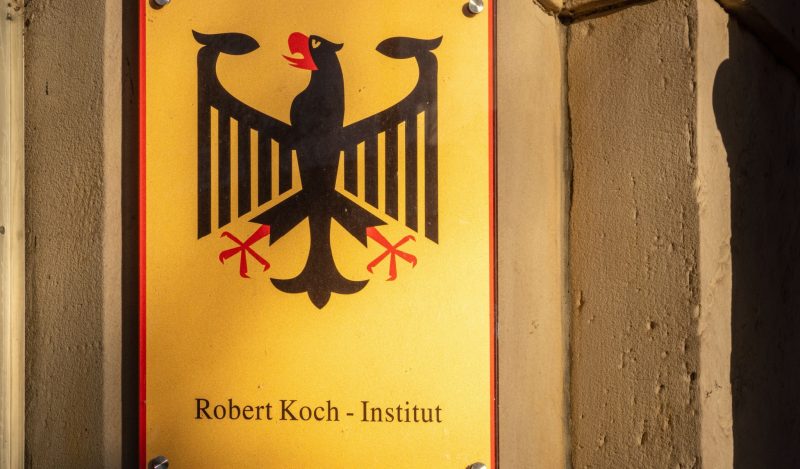The recent publication of thousands of pages of minutes of the Covid-19 “crisis team” of Germany’s Robert Koch Institute (RKI) has caused a buzz in social and even some traditional media, since they appear to show that the German Government decided on many of the most draconian lockdown and containment measures for which the country became known against the scientific advice of its own public health authority.
Germans were, for instance, obliged to wear not just any old masks but nothing less than high-filtration FFP2 masks, even though the minutes contain numerous warnings that wearing FFP2 masks is only appropriate for qualified medical personnel for short periods of time and that sustained use by the general public could even be dangerous.
But if Germany went into a hard lockdown – including schools closures, shop closures, and a ban on public gatherings – without any scientific justification, the obvious question is: why? Paul Schreyer is the Co-Editor of the German online magazine Multipolar, and it was his freedom of information request which would lead the RKI ultimately to release the documents, albeit in heavily redacted form.
It should be noted that the RKI turned over the documents to Multipolar of its own accord. Contrary to what has been widely reported, it was not ordered by any court to do so, although Multipolar speculates that it took the “surprising” decision in order to avoid a court order. It should also be noted that on the magazine’s own account, the RKI turned over the documents not two weeks ago, but in April 2023. So, Multipolar had the documents for nearly a full year before making them publicly available.
Schreyer suggests that even the RKI’s March 2020 decision to “upscale” its assessment of the risk represented by Covid-19 from “moderate” to “high” was made under political pressure and had no scientific justification. That decision was announced by then RKI president Lothar Wieler on March 17th and would, as Schreyer says, serve as the basis for all the subsequent lockdown measures. Angela Merkel would announce radical nationwide measures on March 22nd. But, Schreyer argues, if the number of Covid ‘cases’ did indeed triple in Germany in March 2020, this may only be because the number of Covid tests being administered tripled as well.
If there was political pressure, however, where did it come from? Schreyer alludes to external sources. The usual suspects, as it were: Bill Gates, what he calls the “U.S. pandemic-management scene” and the WHO.
The suspected vector of US influence is one Heiko Rottmann-Großner, a German Ministry of Health official “with excellent contacts to the US pandemic-management scene,” as Schreyer puts it. His only evidence of these “excellent contacts” is Rottmann-Großner’s participation in a one-day pandemic preparedness exercise which was held in Munich in February 2019 under the auspices of an American NGO. But given that the exercise was held in conjunction with that year’s Munich Security Conference, the annual transatlantic security pow-wow which is sponsored by the German Government, it would have been extremely surprising if a representative of the latter had not been invited.
Indeed, none other than the Robert Koch Institute even plays a starring role in the fictional scenario on which the exercise was based, as can be seen here. It is the RKI which discovers that the ‘plague strain’ which is spreading across the world and has shut down global travel was…wait for it…genetically engineered! This must have been flattering for then RKI President Lothar Wieler, who, though not mentioned in the programme, was also present at the exercise, as pictorial evidence uncovered by Schreyer shows.
The Bill & Melinda Gates Foundation has been one of many both private and public supporters of NTI, the NGO which hosted the exercise at the Munich Security Conference. For what it is worth, the Canadian Ministry of Foreign Affairs (Global Affairs Canada) funded the exercise.
But, in any case, Heiko Rottmann-Großner is precisely a German Government official – and one of long standing to boot. As Schreyer notes, he was already the Chief of Staff of then-Minister of Health Hermann Gröhe in Angela Merkel’s third Government from 2013 to 2018.
It was Gröhe’s ministry, incidentally, which sponsored the symposium that brought together Germany’s ‘star virologist’ Christian Drosten and the Wuhan Institute of Virology’s star bat coronavirus researcher Shi Zhengli – as well as many other luminaries of the German and Chinese virology scenes – in Berlin in 2015. (See my articles here and here.)
When Gröhe was replaced as Health Minister by Jens Spahn in Merkel’s fourth Government in 2018, Rottmann-Großner would stay on in the ministry as head of its “health security” subdivision. He continues to hold this position today under Spahn’s successor Karl Lauterbach. It would prove to be, as Schreyer says, “a key position in the Corona crisis.”
According to one would-be insider account of the German Government’s Covid crisis management, which is cited by Schreyer, Rottmann-Großner was calling for a hard lockdown already on February 24th 2020, at a time when the RKI still assessed the risk from Covid as “low.” He would turn up in a more conspicuously public role in September of last year when the Ministry of Health sent him to serve as Lothar Wieler’s ‘minder’ during the former RKI chief’s testimony on the Covid response in the regional parliament of Brandenburg.
It thus appears clear that Rottmann-Großner has played an important and eminently political role in the context of Germany’s Covid-19 response. He has, incidentally, no medical or scientific background, but merely a BA in politics and economics. Much the same could be said of his boss during the Covid years, then-Health Minister Jens Spahn, whose highest degree obtained is an MA in politics.
But just why Rottmann-Großner should be suspected of having represented anything other than German interests in this connection is anybody’s guess.
And what about the WHO? Schreyer writes that at the same time as Rottman-Großner was calling for more radical containment measures in internal German Government deliberations in February, the WHO was also increasing the pressure. Schreyer says that it would increase the pressure even further following its March 11th pandemic declaration, even though, per the RKI’s assessment, the epidemiological situation in Germany had not changed.
But was it really the WHO which was exerting pressure on Germany and not rather Germany which was exerting pressure on the WHO? Indeed, in those early months of 2020 was it even possible to distinguish between the two?
Here are a few facts about the relationship between the WHO and Germany which Schreyer does not mention.
Firstly, in 2020, Germany virtually overnight became the top funder of the WHO: a position which it would maintain throughout the official pandemic years. More importantly and more to the point, it would be far-and-away the top funder of the WHO’s Covid-19 response. If in 2020 German funding alone represented nearly one-third of the WHO Covid-19 response budget, in 2021 it would rise to nearly 40% and the combined contribution of Germany and the German-dominated EU, under the leadership of former German Minister of Defence Ursula von der Leyen, would represent almost half the budget. (It may well have been more than half, since in 2021 a conspicuously large portion of the response budget is listed as coming from “miscellaneous” sources.)
No other country’s contribution even came close. The US, for instance, only provided around one tenth of the German total. The Gates Foundation, whose supposed influence has received far greater attention, provided veritable peanuts by comparison, representing less than 1% of the total budget or around one fiftieth of the German contribution. (For exact figures and a discussion, See my ‘Gates or Germany? Who “Owns” the WHO’s Covid-19 Response?‘)
The Chef de Cabinet of WHO Director-General Tedros Adhanom Ghebreyesus in this period was the German epidemiologist – and current German Foreign Office official – Bernhard Schwartländer. Believe it or not, before becoming Tedros’s Chef de Cabinet in July 2017, just a year and a half before the official start date of the Covid-19 outbreak in Wuhan, Schwartländer had been none other than the WHO representative in China. He presently holds the title of “Global Health Envoy” in the German Ministry of Foreign Affairs. Astonishingly, per his X profile, as seen below, and other documentary evidence (here and here), Germany’s “Global Health Envoy” is based at the German embassy in Beijing.

When, for instance, in late January and early February 2020, Anthony Fauci, Jeremy Farrar, and other Anglosphere scientists and public health officials became concerned by signs that SARS-CoV-2 may have been genetically engineered and wanted the WHO to lead an investigation into its origins, it was to “Tedros and Bernhard” that they appealed, as the below FOI’d e-mail makes clear.

“Tedros and Bernhard” would indeed assemble a team to investigate the origins of the virus. Its much-maligned investigation would dismiss the possibility of a lab origin out-of-hand, focusing almost exclusively on possible zoonotic origins.
The presence of Peter Daszak of the US-based EcoHealth Alliance in the investigation team has drawn a great deal of comment from English-speaking observers. But the team also included Marion Koopmans: the Dutch virologist whose close association with the German PCR-protocol designer Christian Drosten I have discussed here.
More to the point, it also included an official of none other than Germany’s Robert Koch Institute. The RKI member of the team was Fabian Leendertz, a veterinarian and then head of the RKI’s “Epidemiology of Highly Pathogenic Microorganisms” research group. He is presently the Director of the newly-founded Helmholtz Institute for One Health in Greifswald.
This brings us back to Leendertz’s then-boss at the RKI, Lothar Wieler. Like Leendertz, Wieler is a veterinarian. Like Leendertz, he is a proponent of the “One Health” approach to public health, which places emphasis precisely on the risks for human health originating from the animal kingdom.
As Schreyer knows (because he has touched upon it here), in the period in question no other public health official in the world had better connections to the WHO, namely because Wieler was in fact himself a key player at the WHO. As documented in the below excerpt from his current CV on the website of the German National Academy of Sciences (Leopoldina), Wieler was serving as a member of no less than three WHO committees and as the Chair or Co-Chair of two of them.

Most importantly in the present connection, he chaired the committee charged with reviewing the WHO’s International Health Regulations in light of the Covid-19 Response. The revision of the International Health Regulations has formed part of the same process as the more highly publicised ‘Pandemic Treaty,’ which, incidentally, as I show in my article here, Germany has also spearheaded.
As detailed in the same article, the WHO ‘Pandemic Hub,’ which was inaugurated in Berlin in September 2021, is nothing less than a full-fledged joint-venture between the WHO and Germany’s Robert Koch Institute. The hub was created with $100 million in funding from the German Government, and the Charité University Hospital of one Christian Drosten is also a partner.

And, finally, we should not forget the aforementioned Christian Drosten. The WHO would famously adopt Drosten’s PCR protocol as the ‘gold standard’ in Covid testing. Even before the protocol had been ‘validated’ by the EU-funded journal Eurosurveillance in an infamous 24-hour “peer review,” the WHO had already published two earlier versions of Drosten’s protocol on its website. Astonishingly, the earliest version is dated January 13th 2020, i.e., just two weeks after the first official reports of the illness in Wuhan. (Some have questioned whether it was also published that day, but, in any case, as a reference in another Eurosurveillance article shows, it was accessible on the WHO website by January 17th at the latest.)
As the below excerpt from March 9th 2020 correspondence between the US Department of Health and Human Services and the WHO makes clear, by early March the WHO was shipping hundreds of thousands of PCR test kits manufactured by Berlin-based TIB Molbiol. TIB Molbiol is the company of Drosten-collaborator and PCR-protocol co-author Olfert Landt.

Why was the WHO in such a hurry to adopt the notoriously over-sensitive Drosten-Landt test? Could the hundreds of millions of euros which Germany would start pouring into the organisation have had something to do with it?
But what interest could the German Government possibly have had in exaggerating the threat represented by Covid-19? Well, this would be blindingly obvious were it not for three years of incessantly saying “Pfizer” when the actual owner and legal manufacturer of the mRNA vaccine which was the cornerstone of the response to the threat is the German firm BioNTech. As I already showed in detail in my first article on the subject in November 2021, the German Government had long been BioNTech’s state sponsor and would directly sponsor its vaccine candidate.
Even if others may somehow remain befuddled about just whose drug the so-called vaccine really is, in Germany, at any rate, there has never been any doubt. “Invented in Germany, made in Germany,” then German Minister of Health Jens Spahn would say proudly during the inauguration of BioNTech’s mRNA manufacturing facility in Marburg on April 1st 2021.
Indeed, as Spahn noted to in his speech, not just one but two of the three mRNA companies which had been in the running to produce a Covid-19 vaccine were German, the other being CureVac. Both were sponsored by the German Government. The German Government would even directly invest in CureVac in June 2020, thus ensuring the company’s continued existence in case its vaccine candidate did not get the nod – which is exactly what came to pass.
The BioNTech facility in Marburg, Spahn continued, would be a “starting point for the Federal Republic [of Germany] as a whole” – these were his exact words – namely, for making the country into what he called a “vaccine hub.” “We would like to become an mRNA hub…for the world and for Europe,” Spahn said unabashedly – sounding more like a Minister of the Economy than a Minister of Health.
Spahn fondly recalled his first meeting with BioNTech CEO Ugur Sahin “around 12 months ago” and their discussing how the German Government could support the company’s vaccine project. Around 12 months ago? Well, that would take us back to precisely the time when the RKI, according to Schreyer, was raising its assessment of the Covid-19 threat level without scientific justification, based merely upon ramped-up PCR-testing.
Was all of Germany turned into a stage for Covid theatre, with 80 million Germans forced into the role of extras, all in order to help realise the “dream” (as Jürgen Kirchner has put it) of “vaccine hub Germany?”
Republished from The Daily Sceptic
Published under a Creative Commons Attribution 4.0 International License
For reprints, please set the canonical link back to the original Brownstone Institute Article and Author.









